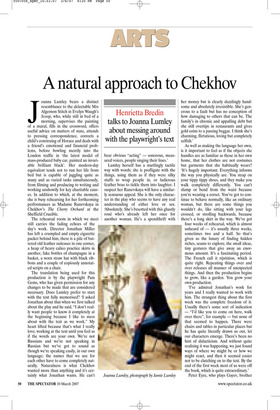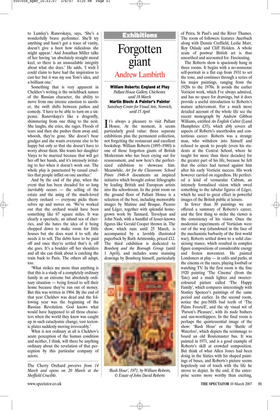A natural approach to Chekhov
Henrietta Bredin talks to Joanna Lumley about messing around with the playwright’s text
Joanna Lumley bears a distinct resemblance to the delectable Mrs Algernon Stitch in Evelyn Waugh’s Scoop, who, while still in bed of a morning, supervises the painting of a mural, fills in the crossword, offers useful advice on matters of state, attends to pressing correspondence, corrects a child’s construing of Horace and deals with a friend’s emotional and financial problems, before bowling merrily into the London traffic in ‘the latest model of mass-produced baby car, painted an invariable brilliant black’. Her modern-day equivalent tends not to run her life from bed but is capable of juggling quite as many and as varied tasks simultaneously, from filming and producing to writing and working unshowily for key charitable causes. In addition to which, at the moment, she is busy rehearsing for her forthcoming performances as Madame Ranevskaya in Chekhov’s The Cherry Orchard at the Sheffield Crucible.
The rehearsal room in which we meet still carries the fading echoes of the day’s work. Director Jonathan Miller has left a crumpled and empty cigarette packet behind him, there is a pile of battered old leather suitcases in one corner, a heap of heavy calico practice skirts in another, fake bottles of champagne in a basket, a worn straw hat with black ribbons and a couple of copiously annotated scripts on a chair.
The translation being used for this production is by the playwright Pam Gems, who has given permission for any changes to be made that are considered necessary. Does Lumley prefer to start with the text fully memorised? ‘I asked Jonathan about that when we first talked about the play and he said, “I don’t really want people to know it completely at the beginning because I like to mess about with the text as we work.” My heart lifted because that’s what I really love; working at the text until you feel as if the words are your own. We’re not Russians and we’re not speaking in Russian but we’ve got to sound as though we’re speaking easily, in our own language; the names that we use for each other have to come completely naturally. Naturalness is what Chekhov wanted more than anything and it’s certainly what Jonathan wants. He can’t bear obvious “acting” — sonorous, measured voices, people singing their lines.’ Lumley herself has a startlingly tactile way with words; she is profligate with the things, using them as if they were silky stuffs to wrap people in, or ludicrous feather boas to tickle them into laughter. I suspect her Ranevskaya will have a similarly sensuous appeal. She is the only character in the play who seems to have any real understanding of either love or sex. ‘Absolutely. She’s besotted with this ghastly roué who’s already left her once for another woman. He’s a spendthrift with her money but is clearly dazzlingly handsome and absolutely irresistible. She’s generous to a fault but has no conception of how damaging to others that can be. The family’s in chronic and appalling debt but she still overtips in restaurants and gives gold coins to a passing beggar. I think she’s charming, flirtatious, loving but completely selfish.’ As well as making the language her own, is it important to feel as if the objects she handles are as familiar as those in her own home, that her clothes are not costumes but garments that she habitually wears? ‘It’s hugely important. Everything informs the way you physically are. You strap on your tippy tippy shoes, and they make you walk completely differently. You can’t slump or bend from the waist because you’re wearing a corset. You’ve got to continue to behave normally, like an ordinary woman, but there are some things you wouldn’t do, like sitting with your legs crossed, or strolling backwards, because there’s a long skirt in the way. We’ve got four weeks of rehearsal, which is almost unheard of — it’s usually three weeks, sometimes two and a half. So that’s given us the luxury of finding hidden riches, seams to explore, the small ideas, tiny gestures that give away an enormous amount. It’s a fascinating period. The French call it répétition, which is quite right. Repeating things over and over releases all manner of unexpected things. And then the production begins to grow, like a garden. You grow your own production.
‘I’ve admired Jonathan’s work for years and I really wanted to work with him. The strangest thing about the first week was the complete freedom of it. Usually there’s some sort of indication — “I’d like you to come on here, walk over there”, for example — but none of that seemed to happen. There were chairs and tables in particular places but he has quite literally drawn us out, let our characters emerge. There’s been no hint of didacticism. And without quite realising it was happening, we just found ways of where we might be or how we might react, and then it seemed easier not to be clutching on to the text. By the end of the first week most of us were off the book, which is quite extraordinary.’ Peter Eyre, who plays Gayev, brother to Lumley’s Ranevskaya, says, ‘She’s a wonderfully brave performer. She’ll try anything and hasn’t got a trace of vanity, doesn’t give a hoot how ridiculous she might appear.’ And Jonathan Miller talks of her having ‘an absolutely straight moral keel, so there is an unassailable integrity about what she does.’ He adds, ‘I wish I could claim to have had the inspiration to cast her but it was my son Tom’s idea, and a brilliant one.’ Something that is very apparent in Chekhov’s writing is the switchback nature of the Russian character, the ability to move from one intense emotion to another, the swift shifts between pathos and comedy. ‘I have to be able to turn on a sixpence. Ranevskaya’s like a dragonfly, shimmering from one thing to the next. She laughs, she cries, she rages. Floods of tears and then she pushes them away and, whoosh, they’re gone. She doesn’t bear grudges and she wants everyone else to be happy but only so that she doesn’t have to worry about them. She wants her daughter Varya to be married because that will get her off her hands, and it’s intensely irritating to her when it doesn’t work out. The whole play is punctuated by casual cruelties that people inflict on one another.’ And by the end of the play, when the event that has been dreaded for so long inevitably occurs — the selling of the estate and the axing of the much-loved cherry orchard — everyone picks themselves up and moves on. ‘We’ve worked out that the orchard would have been something like 67 square miles. It was clearly a spectacle, an inland sea of cherries, and she hates the idea of it being chopped down to make room for little houses but she does want it to sell; she needs it to sell. The debts have to be paid off and once they’re settled that’s it, off she goes. It’s a boulder off her shoulders and all she can think about is catching the train back to Paris. The others all adapt, too.
‘What strikes me more than anything is that this is a study of a completely ordinary family in an extreme but absolutely ordinary situation — being forced to sell their home because they’ve run out of money. But this was written in 1904. By the end of that year Chekhov was dead and the following year was the beginning of the Russian Revolution. God knows what would have happened to all those characters when the world they knew was caught up in such cataclysmic change, vast tectonic plates suddenly moving irrevocably.’ What is not ordinary at all is Chekhov’s acute perception of the human condition and neither, I think, will there be anything ordinary about the revelation of that perception by this particular company of actors.
The Cherry Orchard previews from 14 March and opens on 20 March at the Sheffield Crucible.



























































































 Previous page
Previous page